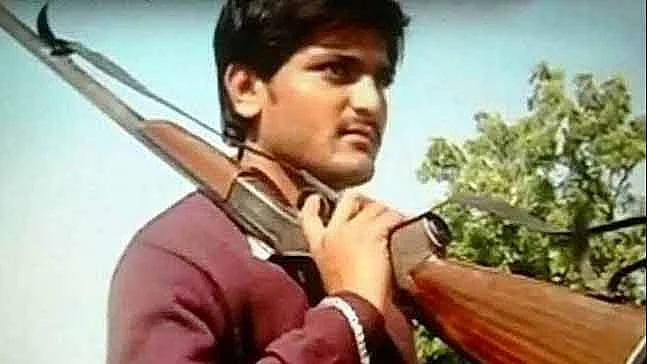If you thought the Patels by virtue of leading the diamond polishing industry in Antwerp or the hospitality industry in America, were prosperous, the Patidar Anamat Andolan Samiti wants you to think again.
The 50-day long Patel protest in Gujarat is being led-by a 22 year old who evidently likes to be photographed with guns and threatens ‘disruptions’, if not violence, if their demand for reservation in jobs and education is not met.
But there is considerable cynicism around the Patels’ demand for reservation in jobs and education.
For one, they are an economically and politically strong community. Two, the protest, coming just before local body elections in Gujarat, seems a bit like political blackmail. And three, the sheer size of the protest that has made PM Modi and Amit Shah take note, could also possibly be backed by elements from within the BJP.
Posterboys Of Development
My father was a cotton farmer living in a village of 500 people in Gujarat’s Bhavnagar district. We are first-generation entrepreneurs.
– Mavji Bhai Patel, Diamantaire to The Economist
The economic history of Patels in Gujarat is perhaps best explained via the success story of India’s biggest diamond exporter.
The Patels were primarily a farming community that produced cash-rich crops, but government sops like tax-free income allowed the community to evolve as small and medium scale industrialists. Today, they hold dominant positions in industries like diamonds, textiles and pharma.
So, What’s Provoked the Patels?
Why then, would a seemingly prosperous community come out on the streets to demand reservation in jobs and education?
1. The section of Patels who did not abandon farming for other businesses, feel they’ve got a raw deal.
2. Discontent rose gradually among the Patels under Narendra Modi as he did not favor any one caste in his 13 years as Chief Minister. In comparison, the community wielded more clout under Keshubhai Patel during his years as CM briefly in 1995 and again between 1998 and 2001.
3. Protesting Patels argue that if the community can fall under the OBC category in states like Rajasthan and Madhya Pradesh, then why not Gujarat.
4. But the immediate catalyst to this sudden grouping and massive following by the Patidar Anamat Andolan Samiti seems to have been the state government’s recruitment drive for permanent jobs. Posts were being filled up after a three-year gap, and those protesting feel the Patels did not get enough jobs.
Why’s The BJP Sweating?
The Patels form roughly 18-20% of Gujarat’s population. Since the mid 1980s, this group has been united and unwavering in its support for the BJP.
Patel Rap
They shifted loyalties en-masse after 1985 when the Congress swept Assembly elections with its Kshatriya Harijan Adivasi Muslim (KHAM) formula. The Congress government under Chief Minister Madhavsinh Solanki had also extended reservation for SC/STs to post graduate medical courses, granted 27% reservation for OBCs and introduced a roster system for appointments to government employees in the reserved category.
If you have ever wondered why the Congress has not been able to claw its way back to power in Gujarat after the 1980s, we have one word for you, and no, it does not start with an “M”.
Catch-22 Situation
Apart from the fact that the BJP depends on the Patels for its grip over Gujarat, the Anandiben government in the state is stuck in a Catch-22 situation. Not just her, but 6 other members of her rather lean 18-member Cabinet belong to the Patel community. Of the 120 MLAs in the Gujarat Assembly, 40 are Patels.
So, to say the community is under-represented in government or in the bureaucracy, would be grossly inaccurate.
So, Is There More To What Meets The Eye?
22-year old Hardik Patel who’s emerged as the “face” of the movement demanding reservation for the Patels insists the movement is completely apolitical. He makes this assertion despite the fact that his father is a BJP worker and was with the Aam Aadmi Party in 2013.
That there is some amount of resentment against Anandiben, cannot be denied. But it is unlikely the agitation is driven by Patel leaders who feel upstaged by her, considering the party discipline Modi’s name still inspires in his home state.
While the Congress is against reservation for the Patels, the party would hope to reap some mileage from a rebellion within the ruling BJP’s vote bank just ahead of the local body elections.
In effect, the Congress would hope that the Patels who unseated them in the late 1980s, may bring them back into the game in 2015.
(At The Quint, we question everything. Play an active role in shaping our journalism by becoming a member today.)
